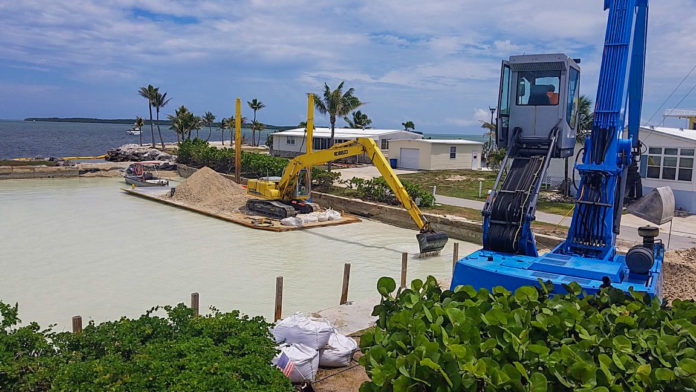
Monroe County is seeking public comment on its plan for managing the quality of canals in the Keys. But time is running out.
At the April 21 Board of County Commissioners meeting, Monroe County’s Chief Resilience Officer Rhonda Haag presented a canal management master plan, which will have to be approved and brought to the state’s Department of Economic Opportunity. The BOCC will accept public comment on this project through May 12.
The county is formalizing the selection and ranking criteria as required in its canal work plan. This will be provided in the county’s annual progress report to the state. A lack of progress on the new canal restoration tasks will result in a penalty from the state: a reduction of 20 percent of the county’s Rate of Growth Ordinance (ROGO) allocations.
“We’re happy (Gov. Ron DeSantis’ office) is interested in our water quality and that the state provides funding and wants accountability,” Haag told Keys Weekly. “That’s good news for water quality in the Keys, and it ensures consistency that local agencies are doing their share.”
In her presentation on April 21, Haag said the county started cleaning up Keys canals voluntarily in 2012 to address the abundance of muck and lack of circulation. Among the steps were the formation of a water quality subcommittee and the canal management master plan, all funded by the U.S. Environmental Protection Agency.
Canal 266 in Big Pine Key was known as being particularly bad due to its smell. “It was one of the worst in the county because residents couldn’t sit in their backyard or sell their house because of that problem,” said Haag.
Through 2012-13, the county’s 502 canals were evaluated for health and water quality, and over the following years, demonstration projects cleaned some canals to test technologies. For example, Canal 266 was restored and has now an “air curtain” to keep out more floating seaweed.
In 2017, after Hurricane Irma, priorities changed due to the necessity to clean the marine debris created by the storm — a $50 million project funded by the U.S. Department of Agriculture that wrapped up in 2020.
But then the state turned its attention back to the health of the county’s canals. DeSantis’ office proposed a 10-year canal restoration program to address 96 canals in unincorporated Monroe County with poor or fair water quality ratings that do not meet minimum state standards. This ranking was created by Haag with consultants from Wood, an environmental engineering company.
The ranking’s suggestion for which canals to address first may seem counterintuitive to the layman. For example, three of the first five canals are labeled as “fair,” not “poor,” yet Haag’s team feels they should be fixed first. The reasoning? Funding.
In 2021, unincorporated Monroe County will get $5 million, if that, from the Florida Keys Stewardship Act. One of the worst canals on the ranking of 96 would cost $50 million to fix. Choosing which canal to fix first comes down to “more bang for the buck.”
“If you look at four half-million dollar projects that might combine to spread the positive impact throughout a larger area, you could have 2 million dollars’ worth of expenditure that would far outweigh the benefit of a single $7 million project,” said Richard Fraxedas, senior Wood consultant.
Canal remediation techniques include organic removal, backfilling, culverts, weed gates and gravity-fed injection wells to improve the overall water quality of the canals. The initial price tag is estimated at $540 million to restore the 96 canals.
Public comment will be accepted on the Guidance Document and selection criteria through Wednesday, May 12. The final set of criteria will be submitted for approval at the regularly scheduled June 16 BOCC meeting. For more information or to submit a comment, visit www.monroecounty-fl.gov/canals. Comments can also be emailed to haag-rhonda@monroecounty-fl.gov or greg.corning@woodplc.com with a subject line of “Canal Restoration Program – Public Comment.”

















